Mighty Minerals
Are You Missing Out?
Get dietary minerals that you can't live without. Find out how these essential nutrients can help you get healthier, fitter and stronger and why you could be missing out.
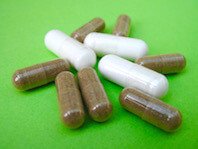 |
Essential Minerals
They can be divided into two categories:
- Required in larger amounts are the macro-elements such as:
- Trace minerals are needed in much smaller quantities. Those considered to be essential include:
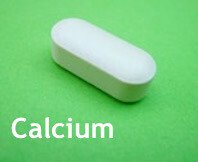 |
What can Calcium do for you?
Benefits include:
- strong bones and teeth
- smooth muscle contractions
- healthy nerve function
- better sleep and relaxation
- protection from some types of cancer
- regulation of heartbeat and normal blood pressure
- help to control cholesterol levels
- assisting proper blood clotting
- reduction of PMS symptoms
What causes a need for extra?
- A diet high in phosphorus from soft drinks, processed meats, poultry and dairy products
- Menopause and pre-menopause
- Pregnancy and breast feeding
- Caffeine intake
- Being over 40 years of age
- Avoiding dairy products
Nutrition Facts
The most abundant mineral in the human body is calcium. Our bodies contain just over 1 kilogram, 99% of which is found in the bones and teeth.
Deficiency Symptoms
- Frequent bone fractures
- Slow healing of fractures
- Muscle cramps
- Backache
- Osteoporosis
- Bone pain
- Muscle weakness
Getting Calcium from foods
Some good sources are milk and cheese, canned fish with bones, soybeans, tofu, nuts, beans, broccoli and kale.
Best Daily Dose
At least 800mg - 1,000mg is required each day by most healthy adults. However, an optimum intake is considered to be between 1,200mg and 1,500mg daily.
High doses are not recommended for those with certain medical conditions such as hyperparathyroidism, chronic kidney disease, or high blood calcium levels.
Always consult a medical professional before adding a supplement to your routine.
Best Calcium Supplement
Calcium citrate, malate and amino acid chelate are the most bio-available and best absorbed forms of the mineral.
More about Minerals
Without their help, vitamins cannot function.
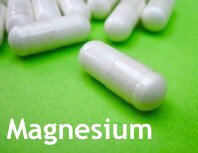 |
Magnesium Benefits
- Supports nervous system
- Improves energy production
- Aids sleep and relaxation
- Supports muscle function
- Helps to alleviate PMS symptoms
- Strengthens bones and teeth
- Maintains better mental health
You might need extra as a supplement if you:
- perspire frequently of excessively
- have trouble sleeping or relaxing
- experience muscle tension
- suffer from stress, anxiety or depression
- have high blood pressure
- consume alcohol
- are a Type 2 diabetic
- have a diet high in sugar
- eat too few vegetables
- are an athlete, exercise regularly or play sports
Signs of Magnesium Deficiency
- Fatigue
- Headaches
- Tooth decay
- Osteoporosis
- Insomnia
- Depression
- Muscle cramps
Best Magnesium Foods
Some good sources are:
- Whole grains
- Seeds
- Nuts
- Seafood
- Dark green vegetables
- Dried fruit
- Bananas
- Tofu
Daily Intake
Getting 300-500 mg of magnesium a day is considered to be a good intake for most healthy adults.
However, higher intakes are not suitable for those with kidney disease.
What to look for in a supplement
The best forms are magnesium citrate or malate, or amino acid chelate.
Magnesium oxide is cheaper but much less effective.
The mineral is also available as a liquid spray that is easily absorbed through the skin.
Nutrition Facts
Throughout the world, iron is the most commonly deficient of all minerals.
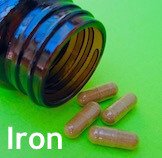 |
What benefits does Iron have to offer?
- Supports immunity
- Helps to transport oxygen throughout the body
- Improves stamina and endurance
- Supports heart health
- Boosts energy
- Promotes mental health
- Ensures efficient muscle function
- Helps fight infections
- Aids brain function
Do you need extra?
Taking a supplement may be useful if you:
- Are a woman having periods or during pregnancy
- Eat a vegetarian or vegan diet
- Have suffered blood loss due to surgery or injury
- Consume tea, coffee or soft drinks containing caffeine
- Are an athlete or enjoy strenuous exercise
Symptoms of Deficiency
- Headaches
- Fatigue
- Lethargy
- Insomnia
- Depression
- Irritability
- Feeling dizzy or light-headed
- Low mood
- Poor concentration
Food Sources of Iron
Some good sources include pork, beef, liver and kidney, shellfish, eggs, beans and dried fruit.
How much do you need?
Men and post-menopausal women require at least 10-15mg of iron each day.
For pregnant and menstruating women, the daily requirement increases to 15-30mg.
Getting Iron from the best supplement
The best form of the mineral is iron bisglycinate, also known as ferrous bisglycinate.
Did you know...
Minerals are needed for every bodily process but they cannot be manufactured by the body - they must be provided by food or supplements.
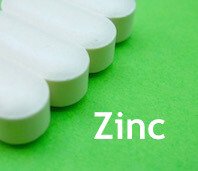 |
Benefits of Zinc include:
- healthy skin
- stronger immune system
- antioxidant properties
- better brain function
- improved mental health
- protection of eyes and vision
- reduction of inflammation
- improved fertility
- healthy prostate gland
- strengthening bones and teeth
- slower aging
You might need extra as a supplement if you:
- suffer frequent illness
- have had surgery or sustained physical injury
- sweat excessively
- are vegan or vegetarian
- struggle with fertility problems
- have Type 2 diabetes
- are aged over 40
Are you getting enough?
Deficiency symptoms include:
- lowered immunity
- frequent infections
- depression
- poor concentration
- fatigue
- infertility
- enlarged prostate
- loss of taste and smell
- premature aging
- wrinkles
- poor hair quality
Getting Zinc from Food
Good sources include shellfish, meat and liver, eggs, whole grains, beans and seeds.
Daily Requirements
Most healthy adults need 15-20mg of zinc each day.
Choosing the Best Supplement
The best forms of zinc are picolinate, citrate, amino acid chelate and gluconate. They are easily absorbed and bioavailable.
More about Minerals
Due to food processing methods and poor quality soil, our foods contain significantly lower levels of these essential nutrients than they did 100 years ago.
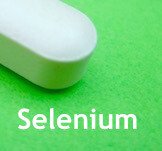 |
What can Selenium do for you?
- Act as an antioxidant
- Support the immune system
- Promote cardiovascular health
- Help prevent cancer
- Protect the skin
- Improve fertility
- Help detoxify heavy metals
- Reduce inflammation
- Protect the eyes and promote good vision
Do you need extra?
Taking a supplement can help if you are:
- regularly exposed to pollution
- trying to conceive
- living with arthritis
- prone to frequent infections
- vegan or vegetarian
Signs of Deficiency
- Lowered immunity
- Frequent infections
- Infertility
- Premature aging
- Arthritis
- Heart disease
- Low energy levels
- Anxiety
Food Sources
Selenium can be found in fish and shellfish, meat and poultry, and organ meats such as liver and kidney.
Best Daily Dose
For most healthy adults, getting 100-200 micrograms (mcg) a day is considered to be an effective intake.
The Best Selenium Supplement
Products containing organic forms of the mineral, such as selenomethionine, are a better choice. They are more easily absorbed and utilized by the body.
Inorganic compounds like sodium selenite are less effective and may be unsafe at high doses.
Home > Minerals